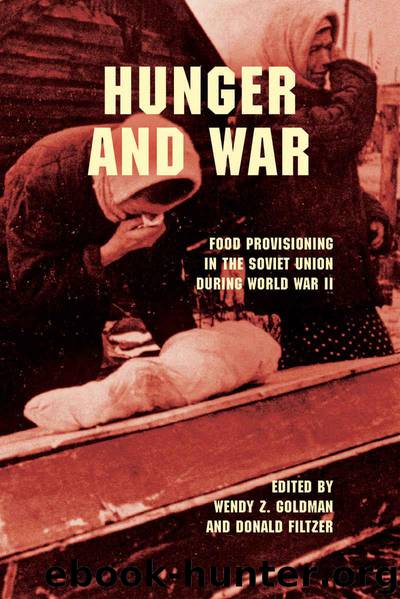Hunger and War by Unknown

Author:Unknown
Language: eng
Format: mobi, epub
Publisher: Indiana University Press
Published: 2015-05-05T16:00:00+00:00
TRADITIONAL ELITES
Workers and the Meaning of Labor
On the one hand, workers in war-related industries faced enormous, if not impossible, labor quotas. On the other hand, they enjoyed some advantages and relative material comforts. First, they had access to the canteens inside their factories and to occasional food parcels sent from the front. Some moved from their apartments into barracks at their work sites, in part to cope with the extended workday. However, this also allowed them to conserve energy and stay warmer. In addition, as of November 5, 1941, the Leningrad City Executive Committee slated workers at one hundred defensive plants to eat at their factories’ canteens off-ration, meaning that they could redeem their coupons for additional food elsewhere.94 These practices were justified pragmatically as well as ideologically. Workers in heavy industry expended a great number calories doing labor that was essential to the war effort. Moreover, as a class, they had long been favored—at least rhetorically—by a regime that had seized power and ruled in their name.
The division between Category I “workers in war-related industries” and Category II “white-collar employees” during the war was not new; it had been used when rationing was instituted in the prewar period. However, from the diarists’ perspectives, the blockade raised the stakes of this distinction. None of the wartime rations provided adequate nutrition or calories for survival. Still, the differences between these two categories were notable.95 First, during the worst months of the famine, those in Category I ate roughly twice as much as everyone else. Workers at the city’s power plants, the Stalin Metal Works, and the Kirov Works, for instance, had a 20 percent lower death rate than the general population.96 White-collar employees’ rations approximated those of dependents and children who did not work and whose norms were so small that their ration card was nicknamed the smertnik, or death certificate.97 Second, the “worker” designation was given to a smaller portion of the population during the blockade—just 34 percent in the winter of 1941–1942.98 It excluded workers in lighter or non-war-related industries. At the same time, it included some elites from the party and intelligentsia, who petitioned to have Category I “worker” status.99
Initially, some diarists applauded the ration system as “necessary,” “logical,” and good for “discipline” because it supported both the war effort and Soviet tenets.100 A Category II worker, Zelenskaia acknowledged that this system of “supporting all those who were able-bodied” and “not feeding those who are dying” was “cruel” but “acceptable” in light of the immediate goal of winning the war.101 However, as the famine became more severe, most diarists grew critical of the workers who were privileged. They objected to this new, ration-based definition of worker in part because it devalued the work done by Category II workers and in part because Category I workers did not seem to work enough to warrant rations that were twice as large. In their eyes, the regime’s claim that food was distributed to “each according to his labor” was dubious.
This perceived inactivity stood in sharp contrast to workers’ industriousness at the start of the war.
Download
This site does not store any files on its server. We only index and link to content provided by other sites. Please contact the content providers to delete copyright contents if any and email us, we'll remove relevant links or contents immediately.
Waking Up in Heaven: A True Story of Brokenness, Heaven, and Life Again by McVea Crystal & Tresniowski Alex(37506)
Still Foolin’ ’Em by Billy Crystal(36078)
Cecilia; Or, Memoirs of an Heiress — Volume 1 by Fanny Burney(32097)
Cecilia; Or, Memoirs of an Heiress — Volume 3 by Fanny Burney(31486)
Cecilia; Or, Memoirs of an Heiress — Volume 2 by Fanny Burney(31438)
Fanny Burney by Claire Harman(26276)
Empire of the Sikhs by Patwant Singh(22782)
We're Going to Need More Wine by Gabrielle Union(18664)
Hans Sturm: A Soldier's Odyssey on the Eastern Front by Gordon Williamson(18342)
Plagued by Fire by Paul Hendrickson(17126)
Out of India by Michael Foss(16697)
All the Missing Girls by Megan Miranda(14866)
Cat's cradle by Kurt Vonnegut(14808)
Molly's Game by Molly Bloom(13900)
Pimp by Iceberg Slim(13829)
Bombshells: Glamour Girls of a Lifetime by Sullivan Steve(13718)
Leonardo da Vinci by Walter Isaacson(12835)
4 3 2 1: A Novel by Paul Auster(11845)
For the Love of Europe by Rick Steves(11727)
